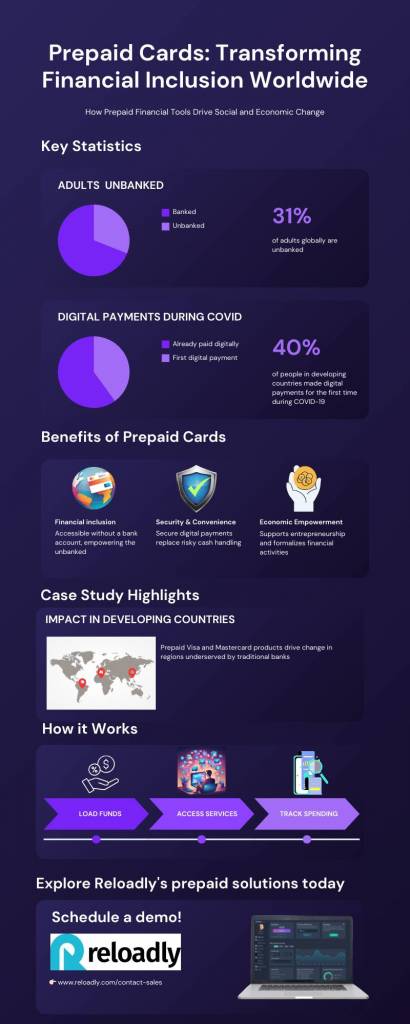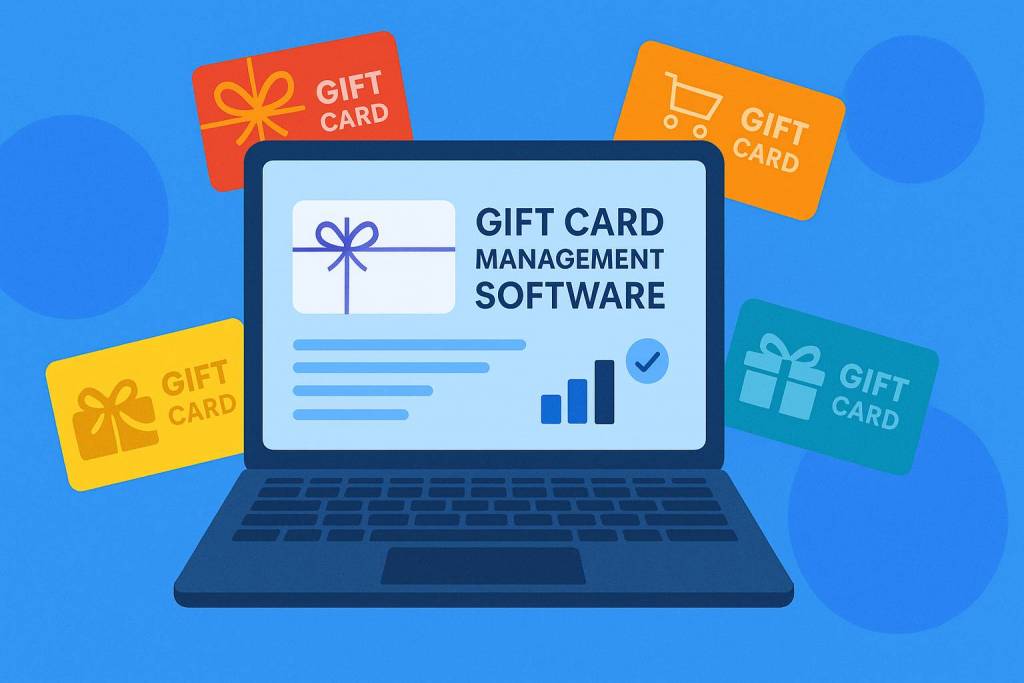What Are Prepaid Payment Cards and Why Are They Important?
Over the last two years, Reloadly has focused much of our attention on building a robust list of new options for different categories of prepaid digital cards. This includes cards for gaming, shopping, entertainment, crypto, and payments. Among these, one of the fastest growing and most impactful categories has been payment cards. In particular, we’ve seen the amazing impact of what enabling the availability of new prepaid financial tools, such as prepaid Visa and Mastercard products, has had in many developing countries.
How Prepaid Payment Cards Drive Financial Inclusion
In today’s increasingly digital world, access to financial tools is essential for economic participation, yet millions of people across underdeveloped countries are still excluded from traditional banking systems. Prepaid financial products, such as prepaid Visa and Mastercard, offer a unique and transformative solution to this problem. These cards are not tied to a bank account, making them accessible to anyone who can load funds onto them, regardless of their financial background or location. As a result, they have the potential to drive significant social and economic change in regions that have traditionally been underserved by financial institutions.
One of the most significant advantages of prepaid payment cards is their ability to break down the barriers to financial inclusion. In underdeveloped countries, where banking infrastructure is often limited or inaccessible, many people face difficulties opening bank accounts due to a lack of required documentation, geographical isolation, or simply the absence of banking institutions in their communities. These issues prevent individuals from participating in the formal economy, limiting their ability to save money, receive payments, or access other essential financial services.
Reloadly Prepaid Visa and Mastercard cards offer an alternative to traditional banking by allowing individuals to store and manage their money in a secure, digital format without needing a bank account. By simply loading funds onto the card, users gain access to a wide range of financial services, such as online shopping, bill payments, and money transfers. This financial accessibility is a game-changer, particularly in regions where the nearest bank branch may be miles away, or where individuals may not have the identification or credit history required to open a traditional bank account.
Furthermore, prepaid payment cards can be linked to mobile wallets, an increasingly popular platform in underdeveloped countries. Given the widespread use of mobile phones in these regions, mobile wallets make it possible for users to access their funds, transfer money, and make purchases at the touch of a button, circumventing the need for physical infrastructure and reducing the reliance on cash.
Prepaid financial tools empower individuals by giving them more control over their financial lives. In regions where informal economies dominate, the shift to prepaid cards allows individuals to formalize their financial activities, leading to increased economic stability and participation. Reloadly is proud to be a small part of helping to expand access to these tools around the world.
Benefits for Small Businesses and Workers
Small business owners in underdeveloped countries, in particular, can benefit greatly from the adoption of prepaid payment cards. Traditional payment methods, such as cash or cheques, come with high risks, including theft, fraud, and the inconvenience of physically transporting money. Prepaid cards offer a secure, efficient way for businesses to handle payments, pay employees, and settle accounts. This security also increases the trust and credibility of small businesses, encouraging greater engagement with suppliers and customers.
For workers, receiving wages through prepaid payment cards ensures faster, safer, and more convenient payments. In many underdeveloped countries, the reliance on cash payments can be both inefficient and unsafe. By using prepaid cards, workers can easily access their wages at any time, reducing the risks associated with carrying large sums of cash or waiting in long lines at remittance centers.
The ability to conduct transactions digitally with Reloadly also opens new doors for entrepreneurship. With access to prepaid payment cards, individuals can engage in e-commerce, purchase goods from international markets, and even create online businesses. This democratization of commerce is crucial in underdeveloped regions where traditional retail outlets may be scarce, and access to global markets is limited. Prepaid cards allow entrepreneurs to tap into these global opportunities and expand their business reach far beyond local boundaries.
The Role of Prepaid Payment Cards in Remittances
Prepaid payment cards even help facilitate easier access to other core industries, such as remittances. In many underdeveloped countries, remittances from family members working abroad constitute a significant portion of household income. However, the process of receiving remittances is often fraught with inefficiencies, including high fees, long waiting times, and the need to travel to remote locations to collect funds. Prepaid Visa and Mastercard cards can revolutionize the way remittances are sent and received.
prepaid payment cards offer a faster, cheaper, and safer alternative to traditional remittance methods. Family members abroad can send money directly to a prepaid card, which can be accessed almost immediately, bypassing the high fees associated with money transfer services and the inconvenience of long-distance transactions. This allows recipients to use the funds for any number of purposes, from paying bills to purchasing goods and services online. Moreover, since these cards can be used to make payments anywhere that accepts Visa or Mastercard, recipients are not limited to cash-based transactions. This global acceptance increases the utility of remittances, providing families with greater financial flexibility and a wider range of options for spending or saving.
Encouraging Savings and Financial Literacy
Another of the often-overlooked benefits of prepaid financial tools is their potential to encourage saving and improve financial literacy. Traditional savings mechanisms in underdeveloped countries, such as informal savings groups or cash under the mattress, are often unreliable, unprotected, and do not earn interest. prepaid payment cards, on the other hand, provide a secure and accessible way for individuals to store their funds. While they do not typically offer interest rates like traditional savings accounts, they still allow users to separate their funds for specific purposes, making budgeting and saving easier.
In addition to providing a safe space for saving, prepaid cards also promote financial literacy by encouraging users to track their spending and manage their balances. Many prepaid card providers offer mobile apps or online platforms that allow users to monitor their transactions, set savings goals, and even receive financial tips. This digital infrastructure fosters a deeper understanding of personal finance and can help users make more informed financial decisions.
The widespread use of prepaid financial tools also contributes to the formal economy by shifting more transactions from the informal sector to the formal financial system. In underdeveloped countries, much of the economy operates informally, where cash transactions dominate and are difficult to track. This informal system can be inefficient, unregulated, and prone to corruption or fraud.
The Future for Prepaid Payment Cards in Developing Markets
By moving towards digital payments, prepaid payment cards help integrate more individuals and businesses into the formal economy. This transition increases transparency, enables better record-keeping, and improves accountability. Governments also benefit from the formalization of transactions, as it opens up new avenues for tax collection and regulatory oversight. In the long term, the formalization of the economy leads to greater stability and sustainable economic growth.
While prepaid financial tools, like Visa and Mastercard prepaid cards, are not a panacea for all of the financial challenges faced by underdeveloped countries, they represent a crucial step towards financial inclusion and economic development. By expanding access to essential financial services, promoting savings, facilitating remittances, and encouraging the formalization of the economy, Reloadly expects that access to new prepaid payment cards will continue to make a tangible difference in the lives of millions of people around the world.
As digital payments continue to grow, the widespread adoption of prepaid payment cards in underdeveloped countries will drive significant economic and social progress. By democratizing access to financial tools, we can empower individuals and communities to take control of their financial futures, participate in the global economy, and achieve greater economic prosperity.
Explore Reloadly’s prepaid payment solutions today—schedule a demo!




